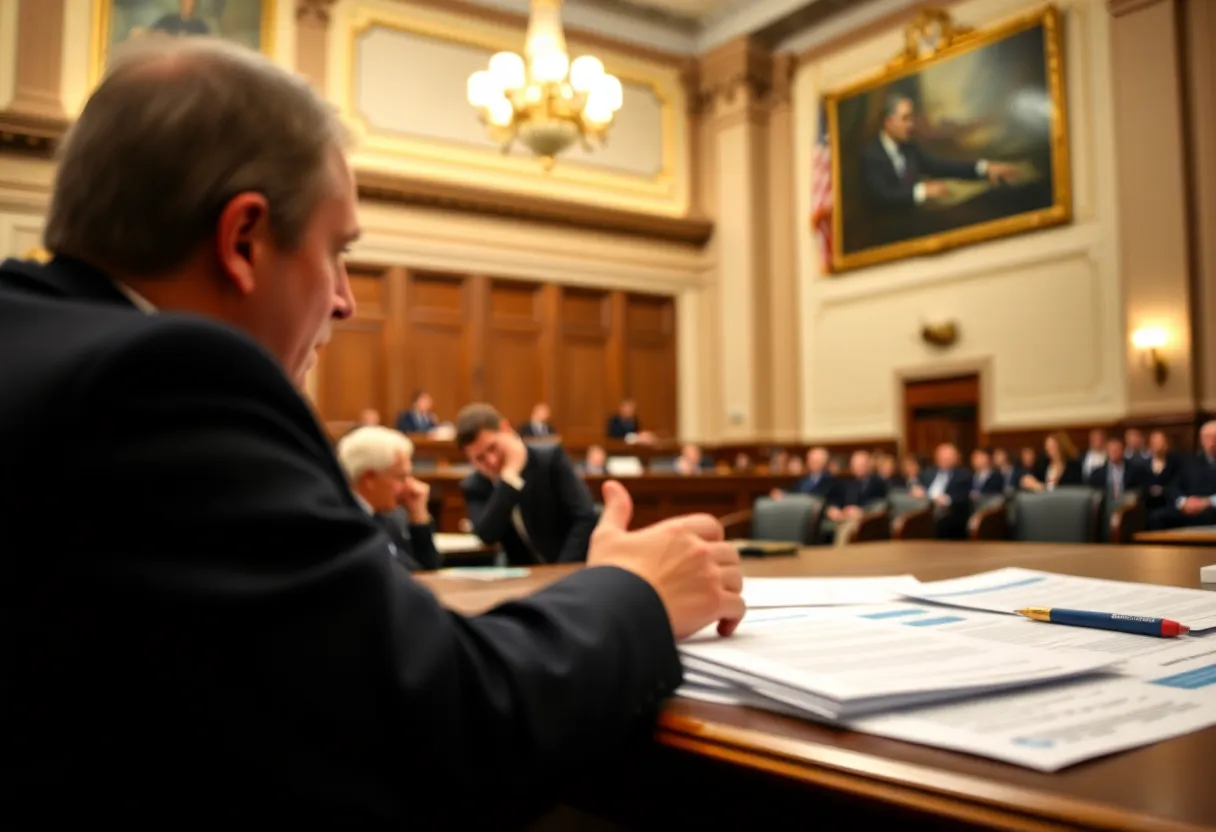News Summary
Paul Nardo, the clerk of Virginia’s House of Delegates, has rejected three vetoes from Governor Glenn Youngkin concerning vital healthcare provisions in the state’s budget. Citing constitutional grounds, Nardo’s decision supports expanding access to weight-loss medications, increasing Medicaid reimbursements for nursing homes, and halting a contingency-based contract for health benefits. This ruling is indicative of ongoing tensions between Virginia’s legislative and executive branches, with potential for further conflict as Youngkin’s administration continues to assert the vetoes’ validity.
Virginia — The clerk of Virginia’s House of Delegates, Paul Nardo, has made headlines by rejecting three vetoes issued by Governor Glenn Youngkin regarding the state’s recently revised two-year budget. Nardo’s decision hinges on the constitutional interpretation rooted in Article V, Section 6 of Virginia’s constitution, which argues that the vetoes were unconstitutional.
The vetoes Nardo dismissed were centered on critical healthcare provisions, including:
- Expanding access to weight-loss medications within Virginia’s Medicaid program.
- Increasing state and federal Medicaid reimbursements to nursing homes with the goal of enhancing personnel departments.
- Preventing the state from entering into a contingency-based contract for managing employee health benefits.
Nardo justified his ruling by stating that Youngkin attempted to veto these specific provisions without rejecting the entire budget appropriation that included these items. According to Nardo, this approach undermines the constitutional requirement that any changes to an appropriation must address the whole item.
Del. Rodney Willett, a Democrat from Henrico who supported the inclusion of weight-loss drugs in Medicaid, expressed satisfaction with the rejection of the vetoes. Willett pointed out that allowing broader access to these medications could have life-saving implications and could lead to considerable cost savings for the state. His proposal for including weight-loss drugs was rooted in findings from a rural health committee that investigated health disparities across Virginia, particularly noting obesity as a pressing public health issue.
Virginia’s Supreme Court has interpreted items in appropriation bills as indivisible. This legal precedent stipulates that if part of a budget item is vetoed, the entire item must be reconsidered. This legal clarification presents a significant challenge to the governor’s intended actions and adds to the ongoing tensions between the executive and legislative branches of the state government.
Despite the clerk’s ruling, Youngkin’s administration has stated that they will continue to operate as if the vetoes are still in effect. This continued stance suggests potential for conflict, with political analysts speculating that this dispute could escalate to legal challenges in the future.
Youngkin, during his tenure, has issued over 400 vetoes, setting a record among Virginia governors. However, during this time, Democrats have failed to secure a supermajority needed to override any of those vetoes. The dynamics of the current political landscape indicate increasing pressure on the Youngkin administration from Democratic lawmakers, who have criticized the governor by drawing parallels between his actions and those of former President Donald Trump for allegedly bypassing constitutional norms.
Previously, Nardo has exhibited a similar approach in blocking vetoes during former Democratic Governor Terry McAuliffe’s administration, citing similar constitutional reservations. This history emphasizes the importance and the weight of constitutional interpretations in state governance.
One of the most disputed vetoes relates to the expansion of weight-loss drug access in Medicaid. The proposal aimed to lower the qualifying body mass index (BMI) threshold from 40 to the mid-30s, widening eligibility for those in need. Medical experts have pointed out that there is a strong argument for investing in weight-loss medications, as improving access may contribute to reducing a variety of related health complications, such as diabetes and cardiovascular diseases, ultimately leading to substantial long-term savings for the state’s healthcare expenditures.
As this situation develops, the implications of Nardo’s decision and Youngkin’s administration’s response could play a significant role in shaping Virginia’s legislative landscape and public health policy in the coming months.
Deeper Dive: News & Info About This Topic
- Wikipedia: Virginia
- Google Search: Virginia constitution
- Google Scholar: Virginia legislative process
- Encyclopedia Britannica: Health care
- Google News: Virginia health policy

Author: STAFF HERE WILLIAMSBURG WRITER
The WILLIAMSBURG STAFF WRITER represents the experienced team at HEREWilliamsburg.com, your go-to source for actionable local news and information in Williamsburg, James City County, and beyond. Specializing in "news you can use," we cover essential topics like product reviews for personal and business needs, local business directories, politics, real estate trends, neighborhood insights, and state news affecting the area—with deep expertise drawn from years of dedicated reporting and strong community input, including local press releases and business updates. We deliver top reporting on high-value events such as Williamsburg Farmers Market, Yorktown Market Days, and Busch Gardens Food & Wine Festival. Our coverage extends to key organizations like the Greater Williamsburg Chamber of Commerce and Colonial Williamsburg Foundation, plus leading businesses in education and hospitality that power the local economy such as College of William & Mary, The Williamsburg Winery, and Sodexo. As part of the broader HERE network, including HEREVirginiaBeach.com, we provide comprehensive, credible insights into Virginia's dynamic landscape.


